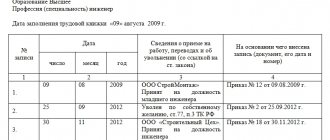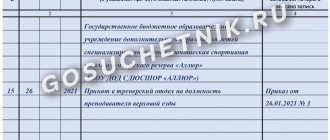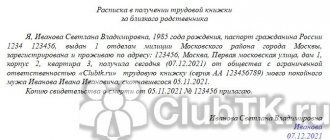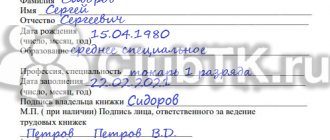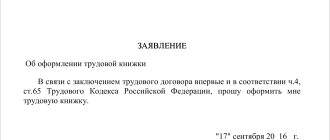What does the legislation say about the delay in issuing labor documents?
According to Art. 84.1 of the Labor Code of the Russian Federation, the head of the company not only does not have the right to withhold the employee’s work book, but is also responsible for this. Delay in issuing a document upon dismissal is regarded as an administrative offense. In this case, the employer will have to answer taking into account paragraph 1 of Art. 5.27 of the Code of Administrative Offenses of the Russian Federation and pay a fine of up to 50,000 rubles. In addition, the company may be required to compensate the employee for material damage based on Article 234 of the Labor Code of the Russian Federation. This does not mean that we necessarily send notice of the work record on the day of dismissal, but we do not recommend delaying the resolution of this issue for several weeks or months.
The work book is issued on the day of dismissal without the employee’s application
The obligation to issue a work book is established by Part 4 of Art.
84.1 of the Labor Code of the Russian Federation: “On the day of termination of the employment contract, the employer is obliged to issue the employee a work book and make payments to him in accordance with Article 140 of this Code. Upon written application by the employee, the employer is also obliged to provide him with duly certified copies of documents related to work.” As you can see, the code does not contain a specific list of work-related documents issued upon dismissal. It only says that they are issued upon a written application from the employee. Based on the mentioned norm, we can conclude that all issued documents are divided into:
- for mandatory ones, issued without any statements from the employee (work book);
- to optional ones, issued at the request of the employee.
Labor Code of the Russian Federation dated December 30, 2001 No. 197-FZ Part 4 art. 84.1
Employer action algorithm
To protect themselves, HR specialists need to know how to act in different situations.
If an employee appears on the last working day and receives documents, the fact of their timely delivery is recorded in the work record book and personal card.
If the employee does not come for the document, the personnel officer documents this fact and puts a mark on the time sheet. After this, the citizen should be notified of receipt of the work book in connection with the dismissal in person or offered to agree to have it sent by mail.
In the rules for maintaining and storing work books, approved. By Decree of the Government of the Russian Federation dated April 16, 2003 No. 225, there is no clear information about which address to send the notification to. Most often, the letter is sent to the address indicated in his personal card. But if the employer has other addresses provided by the employee, the notification is sent to all available addresses where the citizen may reside. This indicates that the manager has taken all possible measures to transfer the documents.
If the resigned employee ignored the notice to appear for the work book and did not respond with written consent to send it by mail, then the document is stored in the personnel department of the enterprise in a specially designated safe until it is issued to the employee. The established shelf life is 75 years.
IMPORTANT!
If you did not send a letter to the employee about receiving a work book upon dismissal or did not receive written consent to send it by mail, sending papers is a violation of Art. 84.1 Labor Code of the Russian Federation.
If a person agrees to be sent by Russian Post, a registered letter is issued with a list of the contents and a notification of delivery. And you should not save on such additional services as an inventory of the attachment and notification of delivery of the item. Judicial practice shows that this will help prove the employer's fulfillment of his duties. A specific example is the appeal ruling of the Sverdlovsk Regional Court dated 09/07/2018 in case No. 33-15689/2018. From the case materials it follows that the employee asked to send him documents related to his work activities by mail. When the letter arrived, there was nothing in the envelope. On this basis, the employee went to court and demanded compensation. The employer had to pay: the court was provided with a receipt for sending the letter, but there was no evidence that it contained the former employee’s work book, since an inventory of the attachment was not compiled when sending.
How to fire an employee for absenteeism
Question:
The employee has not gone to work for three months, does not answer calls, and does not live at the address he indicated when applying for a job. How can I fire this employee?
Answer:
Having considered the issue, we came to the following conclusion: An employee can be fired for absenteeism.
Rationale for the conclusion: One of the grounds for termination of an employment contract at the initiative of the employer is absenteeism committed by the employee, that is, absence from the workplace without valid reasons throughout the entire working day (shift), regardless of its duration, as well as absence from the workplace without valid reasons. reasons for more than four hours in a row during a working day (shift) (subparagraph “a”, paragraph 6 of part one of Article 81 of the Labor Code of the Russian Federation). Thus, if an employee is absent from the workplace during the entire working day (shift) and the employer has reason to believe that the reasons for the employee’s absence are not valid, the employer has the right to dismiss him on the basis of subsection. “a” clause 6 of part one of Art. 81 of the Labor Code of the Russian Federation for absenteeism (see also paragraph 39 of the resolution of the Plenum of the Supreme Court of the Russian Federation dated March 17, 2004 No. 2). It should be noted that the legislation does not contain a list of reasons for absence from work that are recognized as valid, nor does it provide for a procedure for confirming the validity of such reasons. Therefore, in each specific case, the employer must take measures to clarify the reasons for the employee’s absence from work and, depending on the available information, make a decision on the presence or absence of grounds for dismissing such an employee for absenteeism (see in this regard the letter of Rostrud dated October 31, 2008 N 5916-TZ ). If, after dismissal, it turns out that the reasons for absence were valid, the employee can apply to the court with a demand to reinstate him at work. Before applying a disciplinary measure in the form of dismissal, a written explanation must be taken from the employee (part one of Article 193 of the Labor Code of the Russian Federation) about the reasons for his absence from the workplace. We believe that if the employer does not have the opportunity to request an explanation directly from the employee due to his failure to show up for work, it is possible to send the employee a written invitation to appear and give an explanation, which should indicate the period within which the explanation must be provided. The specified period must be determined in such a way that the employee has a real opportunity to appear before the employer to give explanations. We recommend sending the proposal to provide explanations by registered mail with acknowledgment of receipt and a list of the contents to the employee’s known place of residence (other addresses of the employee’s residence known to the employer) so that the fact of requesting an explanation from the employee can be confirmed. If the employee's receipt of the letter is not confirmed (in particular, by a signature on the receipt receipt), there is a risk that the employee will subsequently appeal the dismissal. Failure by an employee to provide an explanation is not an obstacle to applying disciplinary action. As stated in part one of Art. 193 of the Labor Code of the Russian Federation, if after two working days (if the request is sent by mail, two days are counted from the date the employee received the letter) the employee does not provide the specified explanation, then a corresponding act is drawn up. Based on the act of absence from the workplace, as well as a written explanation indicating that the reasons for absence are not valid, or an act of the employee’s failure to provide a written explanation, the employer issues an order (instruction) on dismissal. As the day of dismissal, it seems to us that the safest and most logical option is to indicate the date that coincides with the day the order was issued. The completed order must be presented to the employee against his signature. In the event that an order (instruction) to terminate an employment contract cannot be brought to the attention of the employee, a corresponding entry is made on the order (instruction) (Article 84.1 of the Labor Code of the Russian Federation). The wording could be: “The employee is absent from the workplace. It is not possible to familiarize him with the order.” Based on the dismissal order, an entry is made in the employee’s work book. The period of time between the last day of registered absenteeism, for which the employer requested an explanation, and the day the dismissal order was issued should not exceed 1 month. If it was not possible to meet the specified deadline, it is necessary to repeat the entire procedure for later days of absenteeism, starting with drawing up an absence report and requesting an explanation from the employee. In the event of a long-term absence of an employee from work for unknown reasons, it is recommended to draw up absence reports periodically during the entire period of absence, indicating specific dates of absence from work (see the sample form of an employee absence report (prepared by GARANT experts). According to Part three of Article 84.1 of the Labor Code of the Russian Federation, the day of termination of the employment contract in all cases is the last day of work of the employee, with the exception of cases when the employee did not actually work, but in accordance with the Labor Code of the Russian Federation or other federal law, his place of work (position) was retained. an employee is dismissed during a period of long absenteeism, the day of his dismissal will be the last working day before absenteeism (part three of Article 84.1 of the Labor Code of the Russian Federation). In such a situation, there will be a more or less long period of time between the date of dismissal and the day of registration of termination of employment. In part six of Art. 84.1 of the Labor Code of the Russian Federation provides that the employer for the specified period is not responsible for the delay in issuing the work book. In order not to bear such liability for the period after the dismissal order is issued, the employer must send the employee a notice of the need to appear for a work book or agree to send it by mail. The circumstance that releases the employer from financial liability to the employee for the delay in issuing his work book is precisely the fact of sending the employee a notice of the need to appear for the work book, and not the fact that the employee received such a notice (see, for example, the ruling of the Primorsky Regional Court dated July 25, 2012 N 33-6464). In conclusion, we note that it is not recommended to apply a disciplinary sanction to an employee in the form of dismissal for absenteeism until the circumstances of his absence from work are clarified, since there is a possibility that the employee is absent for a good reason.
Source: information and legal portal GARANT.RU
01/10/2022, 12:55 Subscribe to the magazine
Arbitrage practice
Judicial practice in this area is contradictory. According to the Appeal ruling of the Supreme Court of the Republic of Mari El dated July 24, 2018 in case No. 33-1207/2018, an employee can claim compensation only if he proves that:
- tried to find a job without a book;
- potential employers refused him due to the lack of a document on work experience.
Similar conclusions are contained in the Appeal Ruling of the Voronezh Regional Court dated 02/08/2018 in case No. 33-988/2018, the Appeal Ruling of the St. Petersburg City Court dated 04/04/2017 No. 33-6200/2017 in case No. 2-4428/2016, the Appeal determination of the Nizhny Novgorod Regional Court dated 02/06/2018 in case No. 33-771/2018, other decisions.
But there is another position. For example, in the Appeal ruling of the Sverdlovsk Regional Court dated November 9, 2017 in case No. 33-19615/2017, it is stated that failure to issue a book in a timely manner is a circumstance that deprives an employee of the opportunity to find a job. And no other evidence, including notification of receipt of the work book by mail and a response to it, is required to receive compensation for the delay of the document. This approach is in the Appeal ruling of the Supreme Court of the Republic of Bashkortostan dated September 27, 2016 in case No. 33-19280/2016, the Appeal ruling of the Samara Regional Court dated March 15, 2016 in case No. 33-2471/2016, and other decisions.
Who can get a work book
Usually, upon dismissal, the work book is given directly to the employee. In practice, there are circumstances permitted by law when the book can be:
- issued to the person who received a power of attorney from the employee to receive the document;
- given to a relative of the dismissed person;
- sent by mail;
- preserved by the employer in the manner prescribed by law.
Features of personal issuance
The procedure for obtaining a work record book is more labor-intensive for the employer than for the person resigning. It consists of several stages.
- Filling. It must be fully completed by the day of dismissal, and consists of two important procedures:
- certification by signatures and seals of all records made during the period of work in this organization;
- entering the wording of dismissal.
- Obtaining the employee’s signature in the required column of the personal card (indicating that he received the book in hand).
The employee has not received the book, what should I do?
If on the day of dismissal an employee does not show up to the HR department or his workplace or refuses to receive a work book, the employer needs to insure himself. The situation cannot be left to chance, otherwise a lawsuit may be filed due to the delay in issuing the work permit. The employer must:
- draw up an act stating that the work book has not been issued to the employee (indicate the reason);
- send the employee a written notification of the need to obtain a work book or agree to send it by mail.
Work book – by mail
Such an important document can only be forwarded with the written consent of its owner, that is, the employee. Such consent may be expressed:
- in advance, when the employee asks in writing to send him his work report to the specified address due to the impossibility of appearing for it in person on time;
- in response to a notice sent by the employer.
When will the book be given to relatives?
Close people of an employee can receive his work book only in one very sad case - dismissal due to death. To do this you need:
- make an entry in the book about the termination of the employment relationship;
- make sure of close family ties with the deceased, confirmed by documents (passport, marriage certificate, birth certificate, etc.);
- receive a receipt from a relative for receipt of the work permit (in a simple form).
With the written consent of relatives, you can use postal services.
The document was returned to the employer: to store it or not to store it
Let’s say an employee received a notification that a work book was sent by mail and agreed to the employer’s offer, but for some reason was unable to pick up the documents from the post office. They return back to the employer. If this situation happens in your organization, will you keep the papers?
And the employer from Bashkiria first took the documents of the former employee and then lost them.
After some time, the ex-employee appeared and began to demand either a document or a duplicate. He also went to court with a claim for payment of moral damages and recovery of the average monthly salary for the days of forced absence.
The Judicial Collegium for Civil Cases of the Supreme Court of the Republic of Bashkortostan stated: after the employer sent a notice - a letter to the employee about the need to pick up the work book - and received consent to send it by mail, he is not responsible for the documents. The judges did not satisfy the demand to pay lost wages due to the fact that the ex-subordinate did not take a document from the department. And compensation for moral damage was supported, although the amount was reduced by 20 times compared to the claim (see Appeal ruling dated June 27, 2019 in case No. 33-12901/2020).
As a result, the employer paid the former employee moral damages (5,000 rubles), paid the costs of a representative (7,000 rubles) and spent on paying state fees for considering claims. And if I had kept the documents of the former employee, I would not have incurred any additional expenses.
Labor document of a foreign citizen: send by mail or not
The rules for issuing a work book upon dismissal, approved by law, require that the book be given to the employee for signature on the last working day. If a person does not come for the document himself, the employer prepares a notice of the need to obtain it and at the same time offers to send it by mail. With the consent of the owner, the papers are sent by valuable mail. But if the employee lives outside the country, does he need to send them by mail?
The Ministry of Labor and Social Protection of the Russian Federation believes that this is not only not necessary, but also prohibited by law. In a letter dated September 17, 2019 No. 19-1/OOG-210, officials recalled that there is now a procedure for the export, transfer and request of personal documents of Soviet and foreign citizens and stateless persons from the USSR abroad, which was approved by USSR Law No. dated June 24, 1991 2261-1. It follows from it that neither work books, nor military ID cards, nor identity cards can be sent abroad. In this case, the employer has the right to refuse to send documents about the length of service to the resigned foreign employee, but must keep them “until required”.
The procedure for issuing a work book upon dismissal
The work book refers to official documents of strict accountability. During the implementation of activities, she is located in the personnel department. A document can be missing only as a result of damage or loss, as well as during initial employment. The employer himself issues a new one, or you can get a duplicate from the company where the person previously worked for 15 days. To do this you will need to write an application. This must be done no later than 5 days after hiring.
Filling out, issuing and storing a work book is carried out in compliance with the rules and regulations established by law. The main standards are:
- Labor Code of the Russian Federation;
- Government Decree “On work books”;
- Resolution of the State Statistics Committee No. 1 of 05.05.2001;
- Rules approved by Decree of the Government of the Russian Federation No. 225 of April 16, 2003;
- Instructions of the Ministry of Labor dated 2003.
After dismissal, the employee must receive a work book, salary and necessary certificates on the last working day. In confirmation, he signs in a special journal. If a citizen refuses to do this, an act is drawn up in which three witnesses sign, thereby recording this fact.
Upon dismissal, the employer makes a corresponding note in the document, guided by the above provisions, and gives it personally to the employee. It is unacceptable to transfer labor documents through third parties if they do not have a notarized power of attorney.
It is important to know! If a person does not come to receive it on the appointed day, a notification is sent to his address about the need to appear for a work book.
